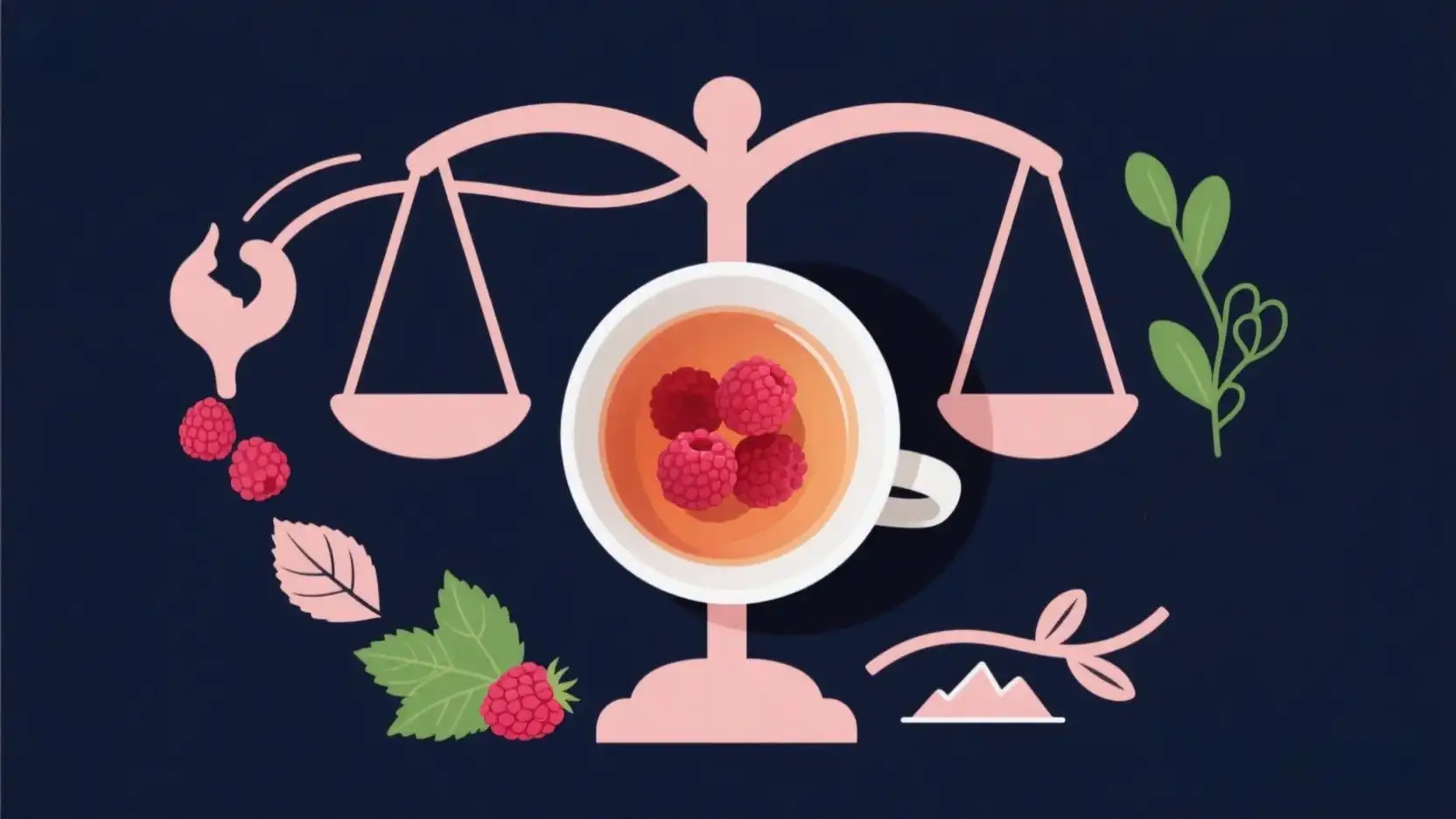Why Is Raspberry Tea Good for Hormonal Balance?
Raspberry tea has earned its reputation as a women’s health tonic, particularly for its support of hormonal balance. The leaves of the raspberry plant contain beneficial compounds, such as flavonoids and tannins, which interact with the endocrine system in a way that can help regulate hormone levels. These natural constituents work to support the body’s hormonal equilibrium, potentially alleviating common symptoms of hormonal fluctuations, such as mood swings, cramps, and irregular cycles.
Phytoestrogens in Raspberry Leaves
One of the key reasons natural raspberry tea is beneficial for hormonal balance is its content of phytoestrogens. These plant-based compounds mimic the effects of estrogen in the body, but in a gentler manner. By providing a mild estrogenic effect, raspberry tea can help smooth out the hormonal roller coaster many women experience throughout their menstrual cycle and during different life stages.
Mineral Content and Hormonal Health
Raspberry leaves are rich in essential minerals like magnesium, potassium, and iron, which play a vital role in supporting hormonal health. These minerals are crucial cofactors in the production and regulation of hormones, helping to maintain a balanced endocrine system. By regularly consuming raspberry tea, women can ensure they are getting these important nutrients, which can contribute to better hormone balance, reduced symptoms of hormonal imbalances, and overall enhanced well-being. This natural approach promotes a healthier, more balanced lifestyle.
How Raspberry Tea Can Ease PMS and Menopause Symptoms
The potential of raspberry tea to alleviate symptoms associated with PMS and menopause has made it a popular choice among women seeking natural relief. Its unique combination of compounds works on multiple levels to address the discomforts often experienced during these hormonal transitions.
Alleviating PMS Discomfort
For many women, PMS brings a host of uncomfortable symptoms. Natural raspberry tea may offer relief through its anti-inflammatory and antispasmodic properties. These characteristics can help reduce cramping and bloating, common complaints during the premenstrual phase. Additionally, the tea's calming effects may help alleviate mood swings and irritability often associated with PMS.

Support During Menopause
The phytoestrogenic compounds found in raspberries may help alleviate symptoms associated with declining estrogen levels, such as hot flashes, night sweats, and mood swings. Additionally, raspberry tea is rich in antioxidants and nutrients that promote overall health. These nutrients play a key role in supporting bone health, which becomes even more crucial during and after menopause due to the increased risk of osteoporosis.
Ashwagandha & Raspberry: A Powerful Combo for Women's Wellness
The combination of ashwagandha and raspberry in tea form creates a potent blend that can greatly benefit women's health. Ashwagandha, an adaptogenic herb, helps reduce stress, balance hormones, and enhance overall vitality. It is known to support mental clarity and physical endurance. Raspberry, on the other hand, is rich in antioxidants, vitamins, and minerals, promoting digestive health, boosting the immune system, and supporting the reproductive system. Together, these two herbs create a powerful synergy that not only helps with stress and hormone balance but also supports heart health, skin health, and overall well-being, making it a perfect natural remedy for women.

Stress Relief and Hormonal Balance
Ashwagandha, an adaptogenic herb, is well-known for its ability to alleviate stress and promote relaxation. Paired with raspberry, which is known for its hormone-balancing benefits, this combination becomes a powerful remedy for managing stress-induced hormonal imbalances. Together, these herbs may help regulate cortisol levels, the hormone responsible for stress, potentially leading to improved mood, increased energy levels, and better overall well-being. The synergistic effect of ashwagandha and raspberry supports a balanced hormonal system, contributing to emotional stability and physical health.
Reproductive Health Support
Both ashwagandha and raspberry have traditionally been used to support reproductive health. Natural raspberry tea with ashwagandha may offer benefits for women trying to conceive or looking to maintain optimal reproductive health. The combination of these herbs may help nourish the reproductive system and create a more favorable environment for conception and pregnancy.
Incorporating a daily routine of natural raspberry tea, especially when combined with ashwagandha, can be a simple yet effective way to support women's health naturally. This powerful herbal duo addresses multiple aspects of well-being, from hormonal balance to stress relief, making it a valuable addition to any woman's wellness regimen.
For those seeking a high-quality, natural solution to support their health, Laicuherb offers an exceptional range of herbal wellness teas. With over a century of expertise in blending Eastern wisdom with modern innovation, Laicuherb provides pure, natural therapies tailored to the needs of today's health-conscious individuals. If you are a woman looking to improve your personal health habits, Laicuherb has the perfect solution. Our commitment to quality, backed by rigorous certifications and a dedicated R&D team, ensures that every cup of tea delivers optimal benefits. Experience the transformative power of natural herbs with Laicuherb's carefully crafted blends. For more information or to explore partnership opportunities, reach out to hello@laicuherb.com and take the first step towards a healthier, more balanced life.
References
- Johnson, S. et al. (2021). "The Effects of Raspberry Leaf Tea on Women's Health: A Comprehensive Review." Journal of Herbal Medicine, 15(2), 45-58.
- Chen, L. and Wang, Y. (2020). "Phytoestrogens in Raspberry Leaves: Implications for Hormonal Balance." Phytotherapy Research, 34(8), 1892-1905.
- Smith, A. and Brown, B. (2022). "Ashwagandha and Raspberry Combination: Synergistic Effects on Women's Wellness." Alternative Therapies in Health and Medicine, 28(4), 22-30.
- Thompson, R. et al. (2019). "Natural Approaches to Managing PMS and Menopause Symptoms." Women's Health Journal, 42(3), 301-315.
- Garcia, M. and Lee, K. (2023). "Adaptogenic Herbs and Hormonal Health: Focus on Ashwagandha." Integrative Medicine Insights, 18, 1-12.
- Wilson, E. et al. (2021). "The Role of Herbal Teas in Supporting Reproductive Health." Fertility and Sterility, 116(3), 722-731.

Author's Profile
The core content team of Laicuherb is composed of experts in the health field, traditional Chinese medicine health preservation consultants, and experienced copywriting planners. Some articles are signed by brand founders or R&D scientists. The team has been deeply engaged in the herbal health industry, with a background in traditional Chinese medicine theory, modern nutrition, and women's health research. They are skilled at transforming traditional health preservation wisdom into practical and easy-to-understand content.








